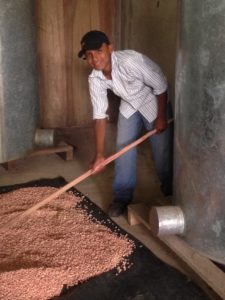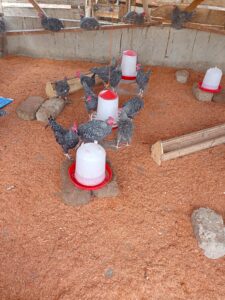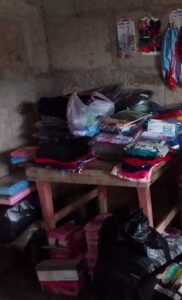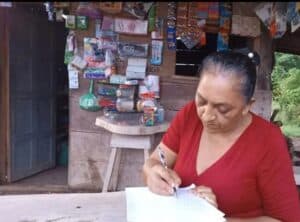
10 Farmers to Plant QPM Seed Corn this Season
As we shared in the last update in March, our Nicaragua Quality Protein Maize (QPM) team has been working hard to re-introduce QPM and QPM seed corn production back into the country. After passing inspection by the Institute for the Protection of Animal and Plant Health (locally know as IPSA) and harvesting, we obtained sufficient Basic seed to plant fields at three sites in Nicaragua (SHI-Quinta Lidia, Alfredo’s farm at Melchorita, and Isidrio’s farm near Los Chiles) in order to produce Registered seed. We also held back several hundred ears for use in maintain the supply of Basic seed.
As a result of this agricultural seed production, today Self-Help has 200 pounds (8 bags) of Basic seed and 900 pounds (36 bags) of Registered seed. Isidro and Alfredo also have 10,100 pounds of Certified seed available for planting or sale. The seed is packaged into 25 pound bags and treated with fungicide; each bag is sufficient to plant 1 manazana of land (1.73 acres).
The current plan is for 10 of our best farmers to plant 1 manazana each of Registered seed in this grow cycle (June – September) for the production of Certified seed; 6 manzanas in the Ochomogo area and 4 manzanas in the Los Chiles area. In Ochomogo, Javier, Mario, Teofilo, Joel, Domingo, and Vicente are prepared to plant multiply the seed under IPSA’s supervision this season. In Los Chiles, Isidro, Ariel, Santana and Celestino have risen to the challenge.
We met with the ten farmers at the seed banks last month, and they are appropriately reluctant to plant more in this cycle because the crop will be harvested during the rainy season and is very difficult to dry to appropriate storage conditions so that the seed quality remains high. More farmers will plant for the production of Certified seed during the next cycle (October-January) which is the best time to grow corn. Naturally, storage of seed in the tropics from harvest to subsequent planting is always a problem and we are exploring methods to ensure that the Basic and Registered seed is grown and stored in sequences that ensure that the best Certified seed is available for commercial planting during the primary maize growing season (October – January). While in Los Chiles, we helped Isidro and his sons treat the seed corn so it could be bagged and marketed the following day.
Pouring seed corn into barrel to be treated
In early 2016, we tested the amino acid profile from the first increase of the seed we obtained from CIMMYT. The results clearly indicated an elevated level of lysine and tryptophan consistent with QPM genetic profile. It will be important to periodically repeat these test (e.g. every three growing cycles) to ensure that Basic seed genetic materials have not been exposed to contamination during subsequent increases. As long as the Basic seed is increased in a disciplined fashion, the nature of the nutritionally improved food crop can be maintained. This discipline was reinforced during this visit and as a result one field exposed to possible contamination was downgraded from Registered to Certified to ensure that there was no possibility that it would be further increased.
 There is still significant need for soil testing and management of nutrients. At the Self-Help training center, we utilize intense farming practices using all three growing cycles during the year including irrigation during the drier periods. This rotation process and the nature of crops can place significant pressure on micronutrients. And, the volcanic soils with high permeability can result in significant leaching of essential micronutrients from the root zone. As a result, we are seeking out a collaboration with a soils expert/volunteer in such a way that we can plan and develop an appropriate soil testing, remediation and crop rotation plan to ensure that the productivity of our resources can be optimized. In addition, some of the knowledge may transfer over to other commercial farmers.
There is still significant need for soil testing and management of nutrients. At the Self-Help training center, we utilize intense farming practices using all three growing cycles during the year including irrigation during the drier periods. This rotation process and the nature of crops can place significant pressure on micronutrients. And, the volcanic soils with high permeability can result in significant leaching of essential micronutrients from the root zone. As a result, we are seeking out a collaboration with a soils expert/volunteer in such a way that we can plan and develop an appropriate soil testing, remediation and crop rotation plan to ensure that the productivity of our resources can be optimized. In addition, some of the knowledge may transfer over to other commercial farmers.
Thank you for your support which has provided the means to re-train Isidro, Ariel, Santana, Celestino, Javier, Mario, Teofilo, Joel, Domingo, and Vicente in seed production after so many seasons without Registered seed available. Now, they are prepared to re-establish the QPM supply in the country for the long term to improve nutrition for those who cannot afford animal-source protein on a daily basis.




